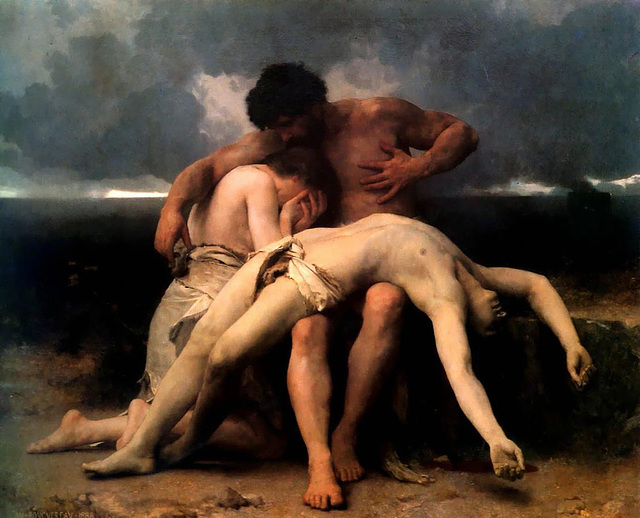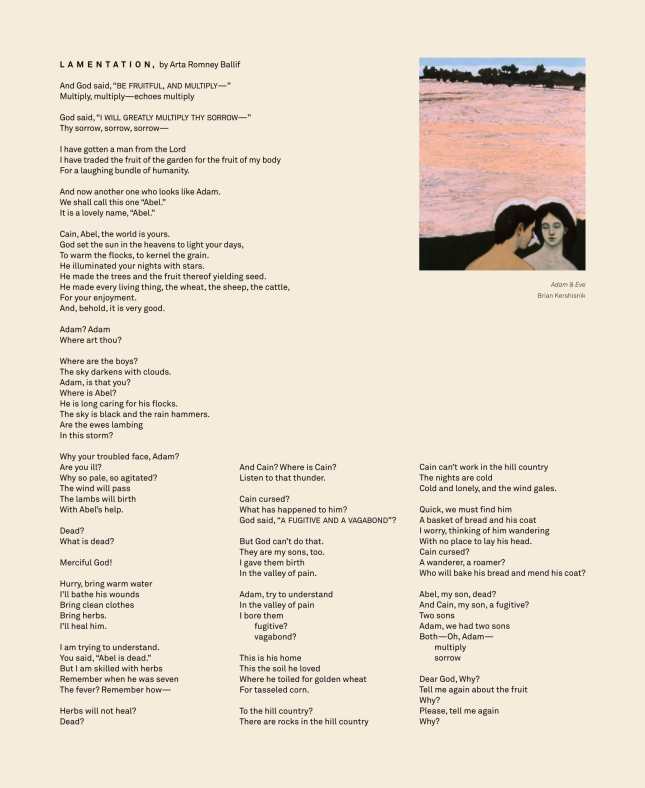
This week in Sunday School I taught a lesson on the story of Cain and Abel. As I studied the story this week, I was struck by the depth of the human tragedy in the story. I imagined how Adam and Eve had invested so much hope into their children.
Cain was Eve’s first child. She partook of the fruit in the garden so that Cain could have a chance at mortality. Eve’s choice of name for Cain reflects that love, hope, and expectation. She declares that she has “gotten a man from the Lord” (KJV), or even more poignantly “I have produced a man with the help of the Lord.” (KJV) The name Cain comes as a word play on “gotten” or “produced,” implying one received or chosen of God. Adam and Eve powerfully loved their son Cain.
And then, they had to watch as Cain moved away from God and towards Satan. They must have longed to reach out to him and help him move through his bitterness and anger. They must have poured out all of their soul in prayer for him, just as a later prophet Alma the Elder poured out his soul in prayer for his wayward son. “And Adam and his wife mourned before the Lord, because of Cain and his brethren.” (Moses 5:27).
And we can also imagine how Adam and Eve looked upon their younger son with such pride. They saw him growing in faith and offering a sacrifice in the similitude of Christ and after the pattern that Adam had set.
And then, the unthinkable. Adam and Eve had not yet experienced death. And yet in one moment, their beloved first born committed the world’s first fratricide. Abel’s blood cried out from the ground. How could they process? How could they cope?
In their grief, Adam and Eve must have fallen back upon the testimony that they earlier bore. Earlier, Adam declared that “in this life I shall have joy.” How would he respond now that he experienced grave sorrow? His knowledge of the resurrection must have buoyed up his troubled spirit: “[A]nd again in the flesh I shall see God.” Eve likewise must have understood in a far more intimate fashion her declaration that without her transgression mankind would have never “known good and evil, and the joy of our redemption, and the eternal life which God giveth unto all the obedient.”
With their faith in Christ, Adam and Eve moved on and continued to have hope. When their son Seth was born, “Adam glorified the name of God; for he said: God hath appointed me another seed, instead of Abel, whom Cain slew.” Adam and Eve continued to hope.
This week, our Stake President suddenly and tragically died from carbon monoxide poisoning. At times of tragedy and loss, I think about our first parents grappling with the first inexplicable tragedy. They took the first step into a world of uncertainty. And they were not sparred the most horrific sorrows one could imagine. Yet, they kept going with faith in Jesus Christ and a certain conviction of the atonement and the resurrection.
I love the words of this beautiful and haunting poem by Arta Romney Ballif that was quoted by Sister Hafen at a JRCLS devotional a few years ago:

**Addendum** A friend asked me why I call Cain the Firstborn, when the Book of Moses suggests that Adam and Eve may have had children before Cain and Abel. I admit that it is entirely possible that Cain was not the first born, and perhaps that is a more natural reading of Moses 5. I base my assumption on a couple of factors 1) The reading of Genesis 5 which has Cain mentioned first immediately after expulsion from the Garden; 2) The name that Eve gives to Cain which seems to imply that Cain’s birth was extraordinary or special in some arch typical sense; 3) Firstborn children played a major role in the Ancient Near East and it would be strange if Adam and Eve’s firstborn were not a named character, and it is clear that Abel and Seth were younger than Cain (especially in the Book of Moses account); 4) Cain being the firstborn would fit nicely with a pattern in the Book of Genesis of the first born child forfeiting blessings due to wickedness (Essau, Reuben, etc.)
